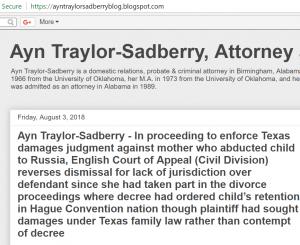
Family Law Attorney Ayn Traylor-Sadberry Announces New Law Instruction Article Series on Family Law
Instructional articles of lawyer Traylor-Sadberry focus on Domestic Relations & Family Law Practice, in a series being published on her Blog
Law Offices of Ayn Traylor-Sadberry, P.C. (N/A:N/A)
English Court of Appeal (Civil Division) reverses dismissal; decree had ordered child’s retention in Hague Convention nation though plaintiff had sought damages under Texas family law
The facts of the case are as follows. In 1990, Lawrence Robert Whyte [plaintiff or the father] married Marsha Whyte [defendant or the mother] in 1990. A child, Nina, was born in January 1995. In September 1995, one of them filed divorce proceedings in the District Court of Harris County, Texas; it led to a final decree in January 1998. The court entered it with both parties’ agreement and accompanied by submission to the court’s jurisdiction. The decree designated both parties as Nina’s “Joint Managing Conservators” but granted the father “primary physical residence” in Texas.
The decree consisted of about 25 pages of the most detailed provisions in relation to Nina’s residence, care and contact with her parents. It specifically provided for Nina’s time with each parent, and her delivery by the one to the other; clause 15 explicitly enjoined either parent from taking Nina to a country not party to the Hague Convention on the Civil Aspects of International Child Abduction, in force for U. S. July 1,1988 [T.I.A.S. 11670]. The clear purpose of that clause is to facilitate control of any breach of the custody orders.
The decree also spelled out sanctions for breach of its terms. For example, Clause 20 provided that a party violating the terms of the decree would be liable for any costs and fees reasonably incurred by the other as a result of the violation. Finally, a note reminded the parties that breach of the order was a contempt of court, punishable by imprisonment.
Flouting the divorce decree in August 1998, defendant exploited one of her periods of agreed custody to abduct Nina to the Russian Republic, a country not one of the over fifty parties to the Convention. She refused to return her. After proceedings in the Russian courts, those courts declined to honor the Texas decree and awarded custody to the defendant.
In desperation, the father had Nina seized in Russia and returned to Texas in December 2001. The defendant’s flagrant defiance of the Texas court order, and the dislocation, distress and trauma that Nina had to go through as a result -- having been at the time of the abduction three and a half years old -- were obvious to the forum court.
The plaintiff, however, did not proceed against the defendant under the divorce decree’s penal provisions; instead he filed proceedings against her under chapter 42 of the Texas Family Code. That allows for damages for “interference with possessory interest in child”. They may include the costs of recovering possession; “mental suffering and anguish” suffered by the plaintiff because of defendant’s disregard of the court’s order as to possession; and punitive damages in respect of actions done with malice. The Texas court ended up ruling for plaintiff in March 2003. It awarded him as against the defendant $867,219 for the costs of getting Nina back; $500,000 for pain and suffering; and $250,000 in punitive damages, totaling over $1.6 million. The defendant took no part in these proceedings. It is that order that the plaintiff seeks to enforce in the English courts. The High Court of Justice dismissed on the grounds of lack of jurisdiction and plaintiff appealed. The Court of Appeal (Civil Division) unanimously allows the appeal.
The Court points out that “Murthy v Sivajothi [1999] 1 WLR 467 adopted the principle that, where the [party] makes a related claim in the sense discussed in the United States authorities and reflected in our own RSC Ord. 16 r. 8(1)(c), that party submits to judicial jurisdiction to resolve “any question or issue relating to or connected with the original subject matter of the action. Whether a particular claim should be regarded as related in this sense must always be a question of fact and degree.”[¶ 6]
The present Court then declares. “These issues have usually been discussed in commercial or property cases, as was Murthy itself. The principle stated [there] is, however, in my view particularly apt for application in a case within the family jurisdiction, where proceedings may affect [a] wide range of the aspects of the parties lives. And it is particularly apposite in the present case. The [original] Texas decree was, if not all about Nina, then at least to a very large extent about her. She was the subject matter of that action. A breach of the orders about Nina in that action was not merely something relating to or connected with the original subject matter, but actually part of the original subject matter itself.” [¶ 7]
“That the mother, by her defiance of the divorce decree, submitted to the penalties available to the court for breach of that decree is not affected at all by the fact that the father chose to proceed under the expansive chapter 42, rather than confine himself to the more limited recourse provided by the decree itself. Chapter 42 is part of the Texas Family Code, and is clearly recognised in that jurisdiction as an inherent part of the protection to be provided to families who have the misfortune to have their affairs regulated by the courts. It is quite impossible to say that the mother did not submit to that regime when she submitted to the divorce decree that it enforces.” [¶ 8]
“The judge [below] was not pressed with the full force of Murthy, because the case seems to have been presented to him through the medium of an earlier appeal in this court, [2004] EWCA Civ 35, in which an attempt was made to enforce the chapter 42 order against the second defendant, who is the mother of Mrs. Whyte.”
“She had become involved in the divorce proceedings because, as a co owner of property with Mrs. Whyte, she had been required to sign a release of various interests as part of the financial settlement in the divorce. Even if, which this court thought doubtful, she had thereby submitted to those divorce proceedings, she had not done so in any way that made it fair or reasonable to say that she had also submitted to proceedings that related, not to the financial aspects of the divorce, but to the custody of Nina, with which the second defendant was not concerned. That case therefore gives no help in the very different issue that is before us. If that had been made clearer to the judge I am satisfied that he would have seen this case in a different light.” [¶ 9]
The appellate court allows the appeal, declares that the courts of this country have jurisdiction to entertain a claim against the mother based on the chapter 42 decree of the Texan court, and remands the proceedings to the Queens Bench Division.
One of the concurring Justices adds the following observation. “The objection to jurisdiction seems to me to depend on the purely technical point that the father elected to seek the redress to which he was clearly entitled by originating petition under chapter 42 rather than by an application in the divorce proceedings. Had he obtained an order for the reimbursement of his costs and expenses under clause 20 of the consent order the mother would clearly have no ground on which to contest jurisdiction. He might have limited his order under chapter 42 to the reimbursement of the same costs and expenses. That only illustrates how unrealistic it would be to find a submission to the jurisdiction in the first instance but not in the second.” [¶ 12]
Citation: Whyte v. Whyte, WL 1650632 (CA (Civ Div)), EWCA Civ. 858.
The complete article will be published on the Blog of Ms. Traylor-Sadberry at https://AynTraylorSadberryBlog.blogspot.com
About Ayn Traylor-Sadberry
Ayn Traylor-Sadberry is a domestic relations, probate & criminal law attorney in Birmingham, Alabama.
Law Offices of Ayn Traylor-Sadberry, P.C.
Telephone: (205) 791-2571
Facsimile: (205) 322-0209
Website: www.TraylorSadberry.com
Email: astlaw@att.net
Ms. Traylor-Sadberry received her B.A. degree in 1966 from the University of Oklahoma, her M.A. in 1973 from the Oklahoma City University, and her Juris Doctor from Howard University School of Law in 1981. She was admitted as an attorney in Alabama in 1989. She is admitted to the following courts:
• Alabama Supreme Court
• Alabama Court of Civil Appeals, Municipal, District, and Circuit Courts of Alabama
After graduation from Law School, she began practicing law with the Law Office of Edward E. May & Associates in Birmingham, Alabama (October 1990 – March 1993). Since March 1993 she has been a solo practitioner focusing on Family Law, Domestic Relations, Probate and Criminal Law.
References
Law Firm Website: www.TraylorSadberry.com
News at: https://hype.news/ayn-traylor-sadberry-attorney-in-alabama-usa/n-026efe87-ae37-4957-9673-81d146a5bde6/stories
Attorney Profile https://solomonlawguild.com/ayn-traylor-sadberry
LinkedIn Profile: https://www.linkedin.com/in/ayn-traylor-sadberry-28a168169/
Facebook: https://www.facebook.com/ayn.traylorsadberry.1
Blog at https://AynTraylorSadberryBlog.blogspot.com
Member of the Chamber of Commerce, https://www.chamberofcommerce.com/birmingham-al/24203184-traylor-sadberry-ayn
Ayn Traylor-Sadberry, Esq
Law Offices of Ayn Traylor-Sadberry, P.C.
(205) 791-2571
email us here
KTN News: 92 countries sign Hague convention international child abduction act
EIN Presswire does not exercise editorial control over third-party content provided, uploaded, published, or distributed by users of EIN Presswire. We are a distributor, not a publisher, of 3rd party content. Such content may contain the views, opinions, statements, offers, and other material of the respective users, suppliers, participants, or authors.






